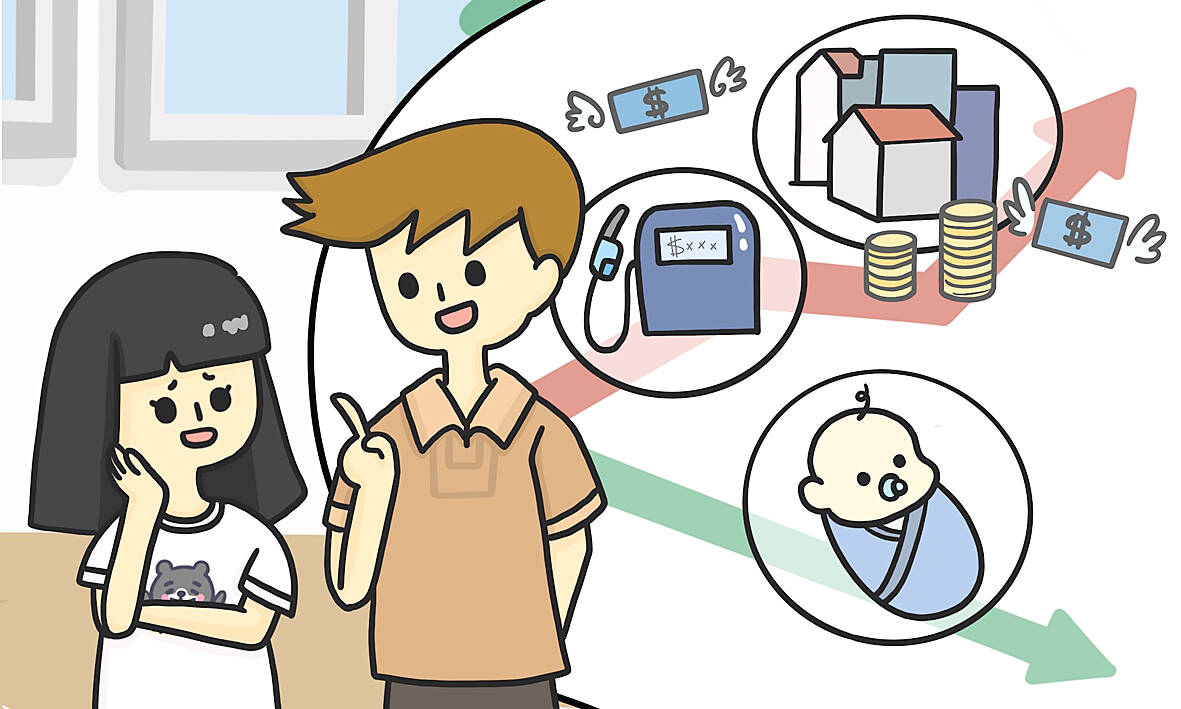對話 Dialogue
馬克:我聽其他朋友說臺灣的生育率幾乎是全球最低的。
Mǎkè: Wǒ tīng qítā péngyǒu shuō Táiwān de shēngyù lǜ jīhū shì quánqiú zuìdī de.

小實:是啊,臺灣常常有新聞報導。
Xiǎoshí: Shì a, Táiwān chángcháng yǒu xīnwén bàodǎo.
馬克:那你知道實際的原因嗎?
Mǎkè: Nà nǐ zhīdào shíjì de yuányīn ma?
小實:嗯……我想,許多人是因為經濟條件吧。
Xiǎoshí: En……wǒ xiǎng, xǔduō rén shì yīnwèi jīngjì tiáojiàn ba.
馬克:是因為薪水不夠,養不起孩子嗎?
Mǎkè: Shì yīnwèi xīnshuǐ búgòu, yǎng bù qǐ háizi ma?
小實:這是其中一個原因,年年上漲的房價和物價也是壓力。
Xiǎoshí: Zhè shì qízhōng yíge yuányīn, nián nián shàngzhǎng de fángjià hàn wùjià yěshì yālì.
馬克:我記得臺灣的政府這幾年提供了許多生育補助,對嗎?
Mǎkè: Wǒ jìde Táiwān de zhèngfǔ zhè jǐ nián tígōng le xǔduō shēngyù bǔzhù, duì ma?
小實:對啊,畢竟生育率也代表著未來的人力。
Xiǎoshí: Duì a, bìjìng shēngyù lǜ yě dàibiǎo zhe wèilái de rénlì.
馬克:看來這不是短時間能解決的問題。
Mǎkè: Kàn lái zhè búshì duǎn shíjiān néng jiějué de wèntí
小實:沒錯,希望我們能早點找到有效的方法。
Xiǎoshí: Méicuò, xīwàng wǒmen néng zǎodiǎn zhǎodào yǒuxiào de fāngfǎ.
翻譯 Translation
Mark: I heard from friends that Taiwan’s fertility rate is almost the lowest in the world.
Xiaoshi: Yes, there are often news reports about it in Taiwan.
Mark: So, do you know the actual reason?
Xiaomi: Well... I think for many people it is about the economic conditions.
Mark: Is it because salaries are not enough to be able to afford to raise children?
Xiaoshi: That is one of the reasons. Rising housing prices and inflation are other causes of pressure.
Mark: I remember that the government has provided a lot of childbirth subsidies in recent years, right?
Xiaoshi: Yes, after all, the birth rate also represents the future workforce.
Mark: It seems that this is not a problem that can be solved in a short time.
Xiaoshi: No, it isn’t, and I hope we can find an effective solution soon.
單字片語 Vocabulary
1. 生育率(shēngyù lǜ) fertility rate
2. 幾乎 (jīhū) almost
3. 報導 (bàodǎo) report
4. 實際 (shíjì) actual
5. 經濟 (jīngjì) economy
6. 條件(tiáojiàn) condition
7. 薪水 (xīnshuǐ) salary
8. 壓力 (yālì) pressure
9. 提供 (tígōng) to provide
10. 補助 (bǔzhù) subsidy
教材音檔 Audio Files
教材影片 Video Files:
https://www.instagram.com/celc.nou_tw/guide/_/17999106352646292/
實踐大學華語中心提供
By Shih Chien University Chinese Language Center: https://chineseusc.com/

US President Donald Trump has renewed his ambition to take control of Greenland for national security reasons and questioned whether Denmark has any legal right to the Arctic island. The debate has revived scrutiny of how Greenland became part of Denmark, its current self-rule and path to independence, and Washington’s military footprint. HOW DID DENMARK GET GREENLAND? Greenland was inhabited by Inuit peoples from Asia and North America intermittently from around 2,500 BC. Around 985 AD, Vikings led by Erik the Red settled in southern Greenland, farming and building churches. Around the same time, ancestors of today’s Inuit arrived, living as hunters

Owls have long fascinated people with their distinctive appearance and mysterious habits. These nocturnal birds possess large, round eyes and a flat facial disc. Their feathers come in shades of brown, gray, or white, helping them blend easily into the darkness. The most remarkable trait of owls is that they can turn their heads without damaging blood vessels. Contrary to popular belief, they can only rotate their heads up to 270 degrees, not 360 degrees. Owls have 14 cervical vertebrae, which is twice as many as humans. This special physical structure compensates for their inability to move their eyes within their

AI-generated summaries are shaking up the media world. Tools like Google’s AI Overviews now provide users with direct answers above the search results, resulting in fewer people clicking on news links. For publishers who rely on that traffic to generate advertising revenue, this shift is hitting hard. The fallout is measurable. Many sites have seen a sharp drop in traffic since AI summary features rolled out. An analysis revealed that a news outlet that had once ranked first on Google lost up to 79% of its traffic when its link appeared beneath an AI-generated summary. Statistics also show that

A: Bloomberg just released its annual travel guide, titled “25 Best Places to Travel in 2026.” What were the best Asian destinations? B: There were actually six Asian hotspots: Taiwan’s Taipei, Malaysia’s Penang, Kazakhstan’s Almaty, Indonesia’s Rote Island, India’s Tiger Reserves, and Oman. A: With its mix of traditional food and modern cuisine, Taipei has become a rising food capital in Asia. B: As Bloomberg reported, “Taiwan is a place that bubbles up in culinary conversation because of its famed beverage, bubble tea, and its early adoption of modern night markets.” A: And Din Tai Fung has now